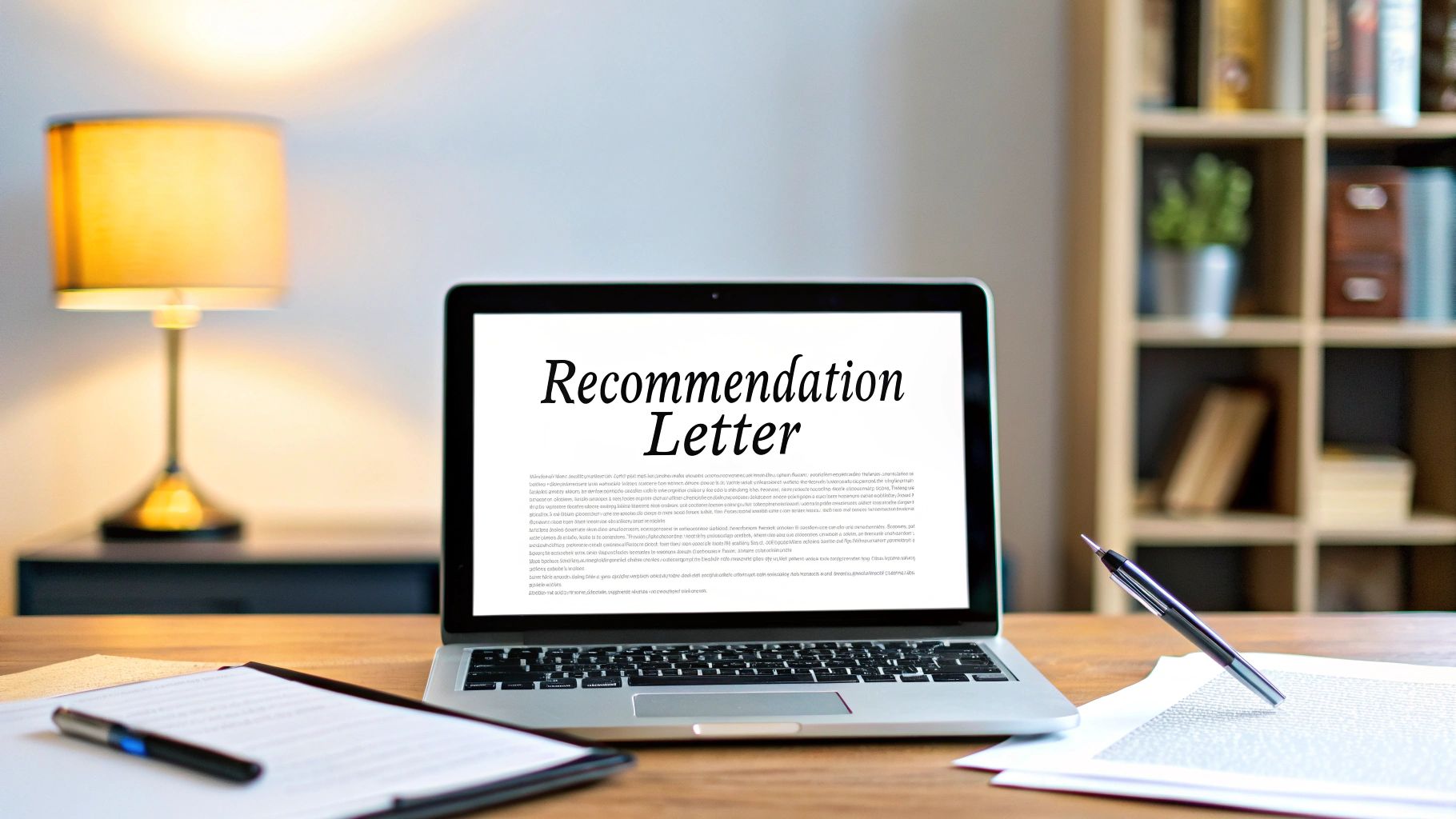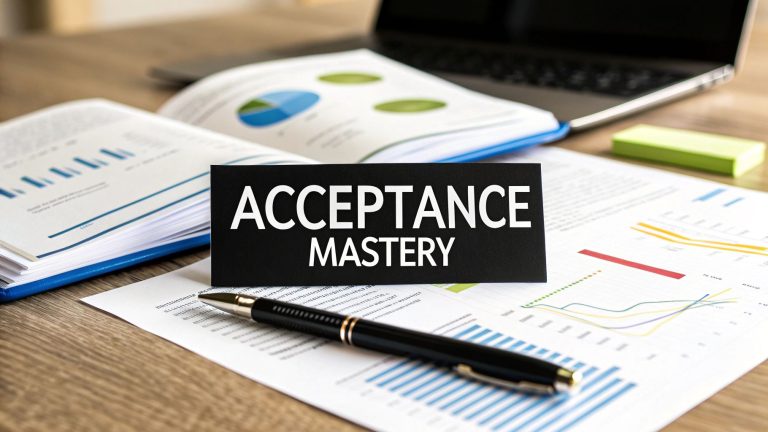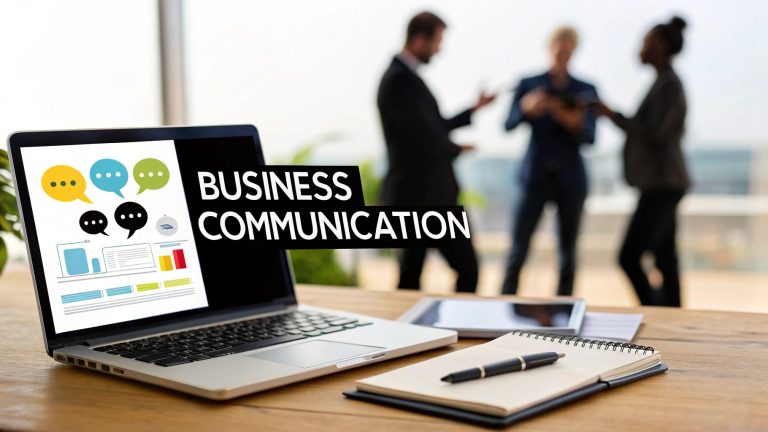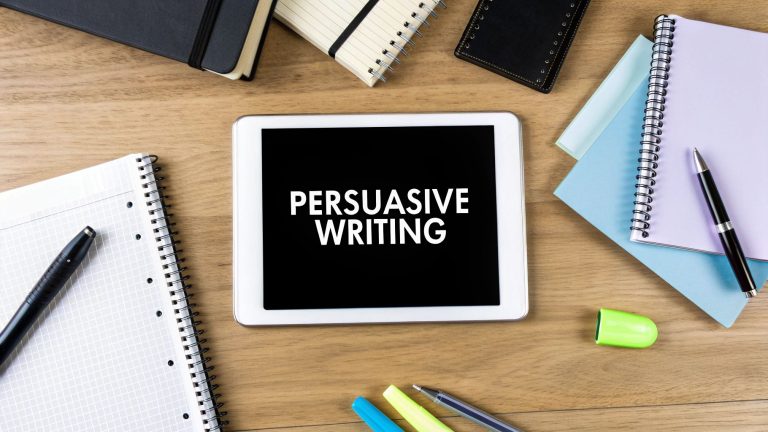When you agree to write a recommendation letter, you're doing more than just filling out a form. You’re giving someone a real shot. A good letter needs to clearly explain who you are, how you know the person, and provide real-life examples of why they're great. It’s your chance to paint a picture of their character and skills that a simple resume never could.
The True Impact of Your Recommendation Letter
Let's be real—a recommendation letter isn't just a box to check. It can genuinely be the deciding factor between two equally qualified people. A resume gives you the "what," but a letter from you provides the "how" and "why." It’s a personal, credible endorsement that gives hiring managers and admissions committees the context they desperately need.

Why Your Words Carry So Much Weight
A powerful letter makes an applicant feel like a real person, not just a name on a page with a list of qualifications. Imagine an admissions officer slogging through hundreds of applications. Your unique story about a student can make their entire file jump out and be remembered. A heartfelt recommendation can literally shape someone's future, especially when they are preparing for university and facing intense competition.
What makes your letter so valuable is that it’s an objective, third-party look at their skills and character. You aren't just confirming that they completed a project; you're testifying to how they did it—with a creative spark, natural leadership, or an impressive amount of grit.
A recommendation letter is the one place where a candidate's soft skills—like teamwork, problem-solving, and work ethic—can be proven with real-world evidence.
What Decision-Makers Look For
People reading these letters are looking for two things: authenticity and substance. They want specific stories that bring a candidate's strengths to life, not just a list of generic compliments. Saying someone "is a hard worker" is nice, but it means almost nothing without an actual example to back it up.
Think of it like a cover letter. In a recent survey, a staggering 94% of hiring managers said cover letters impact their decisions. Your recommendation carries that same persuasive weight.
So, what are they really looking for?
- A Clear Relationship: They need to immediately understand who you are and how you know the applicant. This context is crucial for them to gauge the value of your opinion.
- Specific Anecdotes: Stories stick. A brief anecdote that shows a skill in action is far more powerful than just listing adjectives.
- Genuine Enthusiasm: If your letter sounds like a template you pulled offline, it can actually hurt the candidate's chances. Your authentic voice and sincere endorsement are what matter most.
Knowing what's at stake helps you write something truly meaningful. If you want to dive even deeper into the finer points, our complete guide to reference letters is a great resource.
Before you start writing, it helps to understand the basic structure. I've put together a quick table that breaks down the essential parts of a letter that will get noticed.
Anatomy of a Powerful Recommendation Letter
Here's a quick summary of the core components every great recommendation letter must include.
| Component | Purpose | What to Include |
|---|---|---|
| Introduction | Establish credibility and context. | Your professional title, how you know the candidate, and for how long. |
| Body Paragraphs | Provide evidence of skills and character. | 2-3 specific examples or anecdotes that showcase key strengths. |
| Conclusion | Reiterate your endorsement confidently. | A strong summary of your recommendation and your contact information. |
Think of this as your roadmap. Nailing these three sections will ensure your letter is clear, compelling, and makes the impact your candidate deserves.
Gathering Your Material Before You Write
A powerful recommendation letter is built on a foundation of solid information, not just good intentions. Before you even open a blank document, a little bit of prep work will take your letter from generic to genuinely game-changing. This is your secret weapon for writing something specific, personal, and truly impactful.
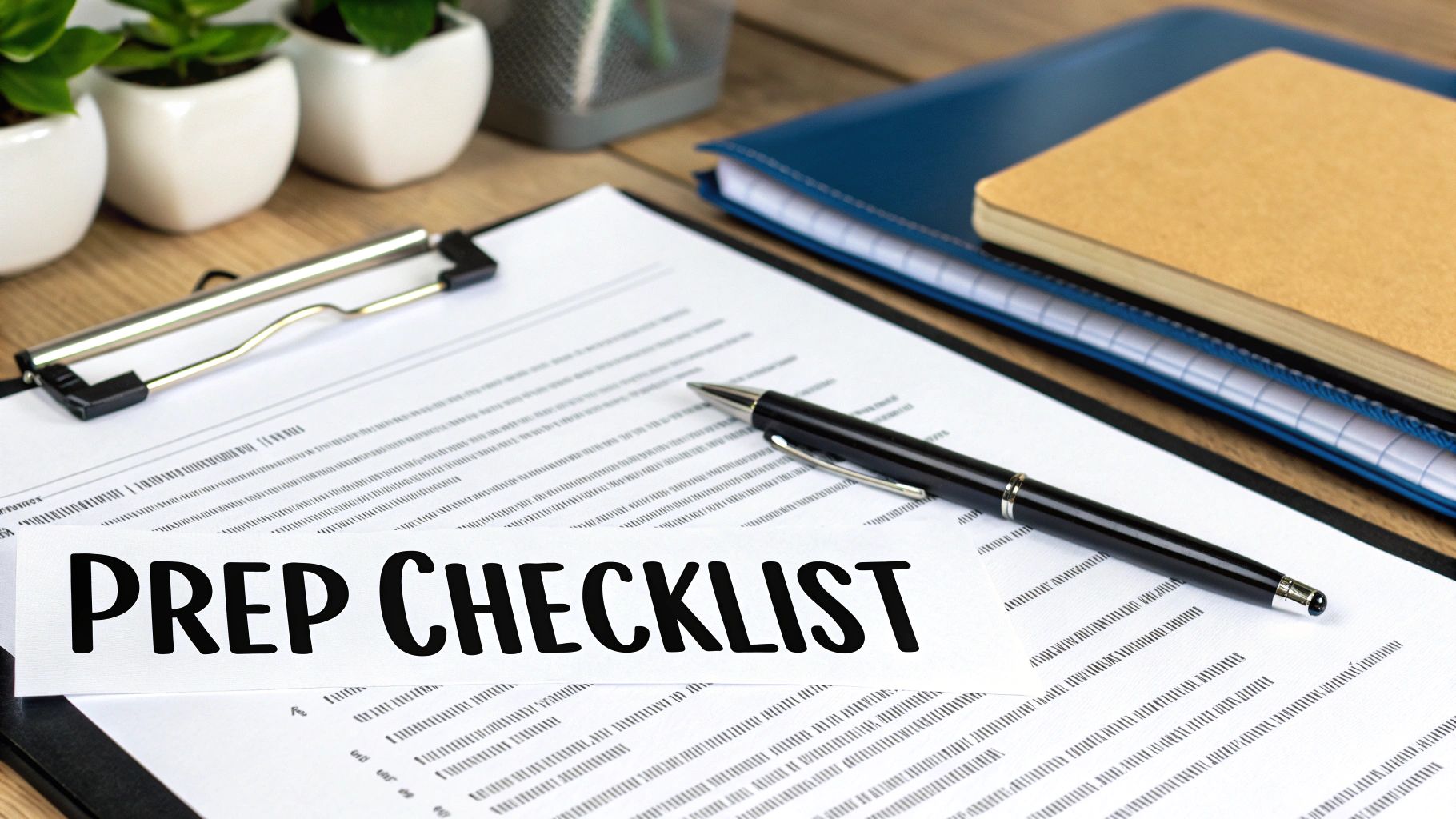
First things first: connect with the person who asked for the letter. A quick 15-minute chat can make all the difference. You'll get on the same page about their goals, which helps you highlight the exact skills and experiences that matter for this specific opportunity. This simple conversation removes the guesswork and sets both of you up for success.
Your Pre-Writing Checklist
To do this right, you'll need the candidate to provide you with the necessary tools. Think of yourself as a storyteller; you need the raw materials before you can weave a compelling narrative. Don't be shy about politely asking them to send over a folder with a few key documents.
This small ask makes a massive difference, turning a vague endorsement into a detailed account of their abilities. For those unsure how to make this request, our guide on requesting a letter of recommendation offers some great pointers for candidates to follow.
Here’s exactly what you should have in hand before you start typing:
- Their Updated Resume or CV: This gives you the 30,000-foot view of their entire professional or academic journey, making sure you don’t miss any key accomplishments.
- The Specific Job or Program Description: You can't write a targeted letter without knowing the target. This document is your map—it shows you which keywords and qualifications the reader is looking for.
- A "Brag Sheet" or List of Accomplishments: This is pure gold. Ask them for a bulleted list of projects, achievements, and skills they want you to emphasize, especially those you worked on together.
That "brag sheet" isn't about arrogance; it's about efficiency. It jogs your memory about the little details and makes sure you're focusing on the wins the candidate is most proud of.
Remember, your role is to validate their accomplishments with your unique perspective. The more specific details they provide, the more authentic and powerful your letter will be.
Should You Always Say Yes?
Agreeing to write a letter is a real commitment. You should only say yes if you can give a genuinely positive and enthusiastic endorsement. A lukewarm or generic letter can sometimes do more harm than good, and it reflects on both of you.
If you don't know the person well enough or can't recall specific, positive examples of their work, it's perfectly acceptable—and often kinder—to politely decline. A simple, honest response is always the best approach.
How to Gracefully Decline
- Be Direct and Honest (But Kind): "Thank you so much for thinking of me. I don't feel I know your work well enough to write the strong, detailed letter you deserve for this opportunity."
- Suggest Someone Else: "I'm honored you asked, but I think [Colleague's Name], who managed your work on the X project, might be able to provide a more relevant and impactful recommendation."
This thoughtful preparation ensures that when you do agree, you're fully equipped to write a letter that opens doors. By gathering these materials upfront, you position yourself to advocate for the candidate with specificity, confidence, and genuine authority.
Crafting a Letter That Captures Attention
Alright, let's get down to actually building this letter, piece by piece. Forget those stale templates you find online. We're aiming to create a genuine narrative, one that tells a story about the candidate's skills and character. Every single sentence needs to pull its weight, guiding the reader from a powerful opening to a memorable closing.
The whole point is to move beyond empty fluff. So many recommendation letters fall completely flat because they're packed with generic praise and offer zero substance. A field experiment in South Africa really drove this home, finding that a shocking 72% of reference letters were missing meaningful details, and 44% didn't even include contact info. They were basically useless to employers. Your letter is going to stand out by simply being specific and well-organized.
Nail the Opening Paragraph
Your first few sentences have a big job to do, and they need to do it fast. You have to clearly state your enthusiastic endorsement, explain how you know the person, and give context for why you're recommending them.
Don't bury the lead. Start with confidence.
Instead of a timid opening like, "I am writing this letter to recommend Jane Doe," go for something with a bit more punch. A strong start immediately gets the reader’s attention and sets a positive, authoritative tone.
Weak Opening: "This letter is in support of John Smith's application for the project manager position."
Strong Opening: "It is with great enthusiasm that I recommend John Smith for the project manager position. I’ve had the pleasure of being his direct supervisor at Acme Corp for the past four years, where I’ve witnessed his exceptional leadership and knack for problem-solving firsthand."
See the difference? The second version instantly builds credibility and tells the reader this letter is worth their time.
Build Compelling Body Paragraphs with Evidence
This is where you make your case. The body of your letter is all about providing the proof. I recommend dedicating a paragraph or two to specific skills or accomplishments, backing each one up with a concrete example.
Just saying someone has "excellent communication skills" is lazy and unconvincing. You have to show it.
The STAR method (Situation, Task, Action, Result) is a fantastic way to frame these examples. It turns a bland claim into a mini-story that sticks in the reader's mind.
- Situation: Briefly describe the context or challenge.
- Task: What was the person’s specific goal or responsibility?
- Action: What exact steps did they take? This is where you highlight their skills in action.
- Result: What was the positive outcome? Use numbers and data if you can.
Let's put this into practice for a candidate named Maria:
Example Using the STAR Method
"During our annual product launch (Situation), we hit an unexpected technical glitch that threatened to throw our entire marketing timeline off the rails. Maria was tasked with coordinating the response between our engineering and marketing teams (Task). She immediately set up a shared communication channel, ran daily stand-ups to track progress, and was brilliant at translating complex tech-speak into clear, actionable steps for the marketing folks (Action). Thanks to her swift and organized approach, we solved the problem 48 hours ahead of schedule and launched without any negative impact on customer engagement (Result)."
That one paragraph says more about Maria's leadership, communication, and problem-solving abilities than a whole page of adjectives ever could. If you're looking for more tips on structuring formal documents, understanding how to write a notarized letter can offer some surprisingly useful insights into clarity and format.
Conclude with a Powerful Endorsement
Your closing paragraph is your final chance to drive your point home. Don't let the letter just fizzle out. You need a strong, confident summary that leaves no doubt about your recommendation.
This is also the spot to provide your contact information and invite the reader to get in touch. A simple offer to chat further shows you truly stand behind your words. For a broader look at letter formatting, our guide on how to write a letter has some great pointers.
A Strong Closing Example
"In short, Sarah is a talented and dedicated professional who would be an incredible asset to your team. I recommend her without the slightest reservation. Please don't hesitate to contact me at [Your Phone Number] or [Your Email] if you'd like to discuss her qualifications in more detail."
That's how you end it—direct, confident, and professional. It’s a final impression that will stick.
Using the Right Tone and Avoiding Hidden Bias
The words you pick have real weight. They can make your letter a powerful endorsement or, without you even realizing it, subtly hold a candidate back. Finding the right tone is a bit of a balancing act. You want to sound professional and credible, but not robotic. You want to be warm and genuine, but not so casual that you lose your authority.
The best way I can describe it is to imagine you're talking to a respected colleague. Your tone would be clear, confident, and sincere. This is where a lot of people go wrong—they either get too stiff and formal, or they fall back on clichés that make the whole thing feel generic.
Your goal is to show real enthusiasm, and then back it up with solid proof.
Striking the Professional-Personal Balance
The sweet spot you're aiming for is enthusiastic professionalism. You're advocating for someone, but you're also providing an objective assessment of their skills. That means steering clear of overly casual phrases like "she's a rockstar" or extreme statements like "he's the single best employee I've ever had."
Even though you mean well, that kind of language can sound like an exaggeration and actually make you seem less credible.
Instead, let your specific examples do the talking. A short, powerful story about how a candidate navigated a tough project says so much more than a generic compliment ever could. Your confidence in them will shine through the strength of your evidence, not the volume of your praise.
Of course, following basic letter writing etiquette and dos and don'ts is always a good foundation for keeping your communication respectful and professional.
Confronting Unconscious Bias in Your Writing
This is one of the most important—and toughest—parts of writing a great recommendation letter. Unconscious bias can easily sneak into our language. We might write a letter that feels positive, but it may contain subtle words and phrases that unintentionally weaken a candidate’s profile. This happens most often with women and candidates from underrepresented groups.
The infographic below shows the basic framework of a strong letter. Every single part of it, from the opening to the closing, needs to be written with an eye toward fairness.
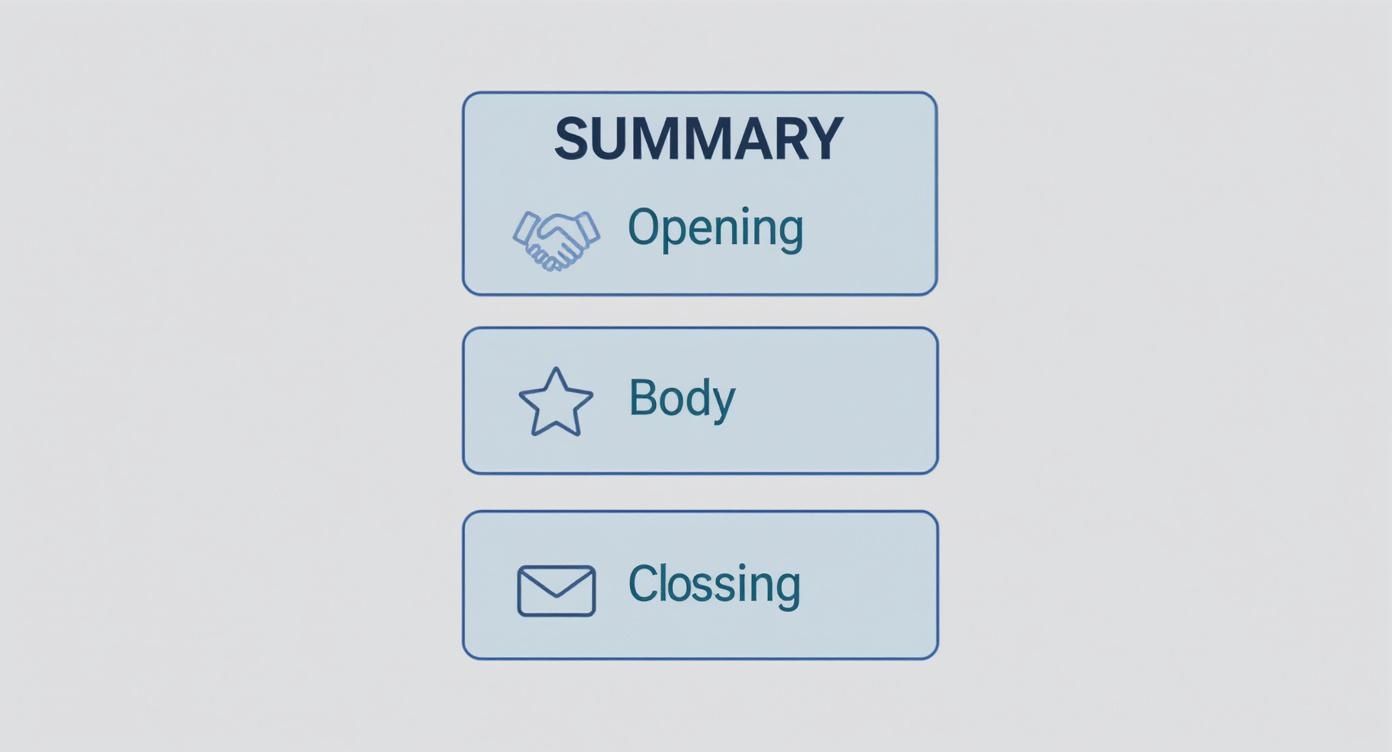
Research has shown a clear pattern. Letters for men are often filled with "agentic" words—think leader, assertive, and analytical. But for women, recommenders tend to lean on "communal" words like helpful, collaborative, and caring. While those are great qualities, they can paint a picture of someone who is a good team player rather than a leader.
The first step is simply being aware these patterns exist. It helps you catch them in your own writing.
Practical Steps for Writing Fair and Equitable Letters
To make sure your letter is as powerful and fair as possible, you have to be deliberate about the words you choose. It takes a conscious effort to describe every candidate with the same level of strong, impactful language, no matter who they are.
Here’s a quick checklist to run through before you send your letter:
- Focus on what they did: Center your letter on tangible accomplishments. Talk about the projects they led, the results they delivered, and the skills they proved.
- Use strong, active language for everyone: Instead of saying someone was "a pleasure to work with," describe how they "proactively identified and solved a critical bottleneck in our workflow."
- Watch out for "doubt-raising" phrases: Words like "She has the potential to be a great leader" can sound weaker than "She is a great leader." Scan for any language that unintentionally hedges your endorsement.
- Compare your letters: If you’re writing more than one, put them side-by-side. Are you describing men and women differently? Are you using more powerful verbs for certain candidates?
It’s easy to get stuck using common phrases that seem harmless but carry hidden bias. Here’s a quick look at some common culprits and how you can reframe them for a much stronger impact.
Common Biased Language and Powerful Alternatives
| Weak or Biased Phrase | Why It's Problematic | Stronger Alternative |
|---|---|---|
| "She is so articulate." | Often used for women and minorities in a way that implies surprise. It focuses on delivery, not substance. | "She communicates complex ideas with exceptional clarity and impact." |
| "He's very ambitious." | Can carry negative connotations, especially for women, implying ruthlessness. | "He sets and pursues aggressive goals, consistently driving results." |
| "She is helpful and kind." | A communal trait that positions her as a supporter, not a driver of action or results. | "She is a strategic collaborator who elevates the entire team's performance." |
| "He has the potential to…" | This phrase introduces doubt and sounds less confident than a direct statement of ability. | "He consistently demonstrates the ability to…" or "He is a proven leader who…" |
By being more intentional with your language, you can ensure your letter provides the strongest possible support, free from hidden biases that can hold deserving people back.
Putting It All Into Practice: Real-World Examples
It’s one thing to talk about the theory behind a great recommendation letter, but seeing it in action is what really makes the concepts click. When you see how the pieces come together, you can move from just understanding the advice to actually using it.
Let's look at a few examples for some of the most common requests you'll get. Think of these less as templates and more as annotated breakdowns showing the principles we've discussed at work.
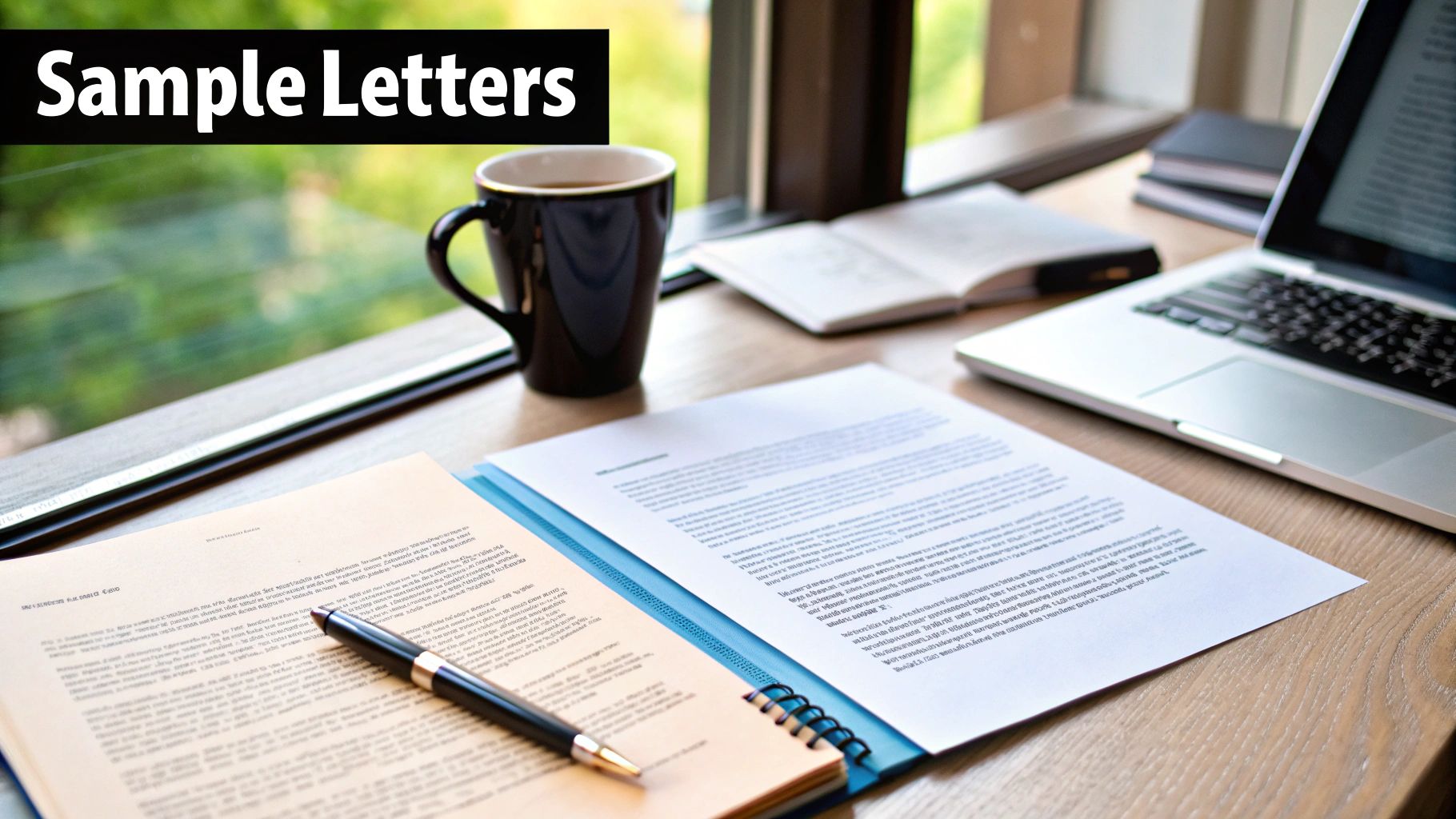
I’ve added notes to each one to explain why certain phrases or stories were chosen. You’ll see how a specific anecdote can highlight key skills and how the right structure guides the reader toward a confident "yes."
For a Former Student Applying to Graduate School
When you’re writing for a student, your job is to connect the dots between their academic work and their future potential for research and high-level thinking. The tone should be academic and professional, but it absolutely needs a personal touch.
Example Snippet:
“I am delighted to recommend Amelia Chen for the Master of Data Science program at Crestview University. As her professor for both ‘Advanced Statistical Modeling’ and her senior capstone project, I have had the pleasure of observing her intellectual growth over the past two years.
Why this works: The opening is direct and confident. It immediately sets up the writer's credibility by defining the relationship and how long they've known the student.
Amelia’s standout quality is her remarkable ability to translate dense theoretical concepts into practical applications. For her capstone project, she was tasked with analyzing a large, unstructured dataset from a local nonprofit to identify donor engagement patterns. While other students struggled with the initial data cleaning, Amelia independently developed a Python script that automated over 80% of the process, saving her team weeks of manual labor. This initiative not only demonstrated her technical proficiency but also her proactive problem-solving mindset—a critical skill for any graduate student.
Why this works: This paragraph is pure gold. It uses a specific story (the capstone project) to show off multiple skills at once: technical prowess (Python), initiative, and problem-solving. That quantifiable result—automating 80% of the work—makes her achievement impossible to ignore.
For a Direct Report Seeking a Promotion
Here, the focus shifts to professional growth, leadership ability, and their direct impact on the business. You want a professional, results-focused tone that paints a clear picture of their value.
Example Snippet:
“David Ortiz has been an invaluable member of my marketing team for three years, and I wholeheartedly recommend him for the Senior Marketing Manager position. In his time as a Marketing Specialist, he has consistently demonstrated the strategic thinking and leadership qualities required for this next step.
Why this works: It’s a clear endorsement for the specific role he wants. This framing tells the hiring manager that his current performance is a solid foundation for success at the next level.
Last year, David volunteered to lead our 'Q3 Lead Generation' campaign, which had historically underperformed. He didn’t just execute the existing playbook; he re-envisioned it. David conducted a thorough analysis, identifying that our primary channel was no longer effective. He then pitched and led a new multi-channel strategy incorporating targeted social ads and a webinar series. His leadership directly resulted in a 150% increase in qualified leads compared to the previous year and generated over $250,000 in new pipeline revenue.
Why this works: This is a perfect demonstration of the STAR method. It lays out a challenge, shows David's specific actions, and delivers powerful, metric-driven results. The 150% increase and $250,000 in revenue are the kind of hard numbers that prove his impact far better than any adjective could.
For a Coworker You Collaborated With
Writing for a peer is a bit different. You’re not their boss, so your perspective on their teamwork, reliability, and attitude is incredibly insightful. Your goal is to speak as a partner who has seen their contributions firsthand. The tone can be a little less formal but must stay professional.
Since you’ve been in the trenches with them, you can highlight how they handle shared deadlines, contribute to a positive team dynamic, and communicate with colleagues—qualities a manager might not see.
If you're looking for more tips on this specific scenario, our guide on writing a recommendation letter for a coworker has some excellent, targeted advice.
As you can see, the most powerful letters are really just a collection of mini-stories backed up by solid evidence. By using these techniques, you can turn any recommendation request into a compelling story that helps someone take the next big step in their career.
Lingering Questions About Writing Recommendation Letters
Even when you think you’ve nailed the perfect letter, a few nagging questions can pop up. Handling these final details is just as crucial as writing the core of the letter. Getting these last bits right ensures your recommendation lands on time, in the right format, and leaves a fantastic impression.
Let's walk through some of the most common questions and sticking points that come up. This is your final once-over before you send it off.
How Long Should This Letter Be?
This is easily the most common question I get, and it’s a good one. You need to be detailed enough to be persuasive, but not so long that you lose your audience.
The sweet spot for a powerful recommendation letter is one full page. That usually works out to be somewhere between 400 and 500 words. This gives you plenty of room to introduce your relationship, share two or three standout examples of their work, and wrap it up with a confident endorsement.
A letter that’s too brief—say, under 300 words—can come across as unenthusiastic or like you don't know the person well. On the other hand, a letter that drags onto a second page is asking a busy reader for too much of their time. Make every word count.
What If I Can't Think of Specific Examples?
If you’re drawing a blank on specific stories or achievements, that's a big red flag. It’s a sign that you need more information before you even start writing.
Your best move is to go straight back to the source: the candidate. Ask them to send over a "brag sheet" that includes:
- Their most recent resume
- The description of the job or program they’re applying for
- A few bullet points about projects you collaborated on
- Any specific accomplishments or metrics they think are important
This isn’t about cutting corners; it's about being thorough. Their notes will jog your memory and provide the details you need to build a compelling narrative. But if you look over their materials and still can’t honestly recall specific, positive contributions, it’s better to politely decline. A vague, generic letter can hurt their chances more than no letter at all.
Is It Okay to Let the Candidate Write a Draft for Me?
This practice has become surprisingly common, but my advice is to avoid it. The whole point of your letter is to offer an authentic, third-party perspective. A letter ghost-written by the candidate themselves will almost always sound…off. Seasoned hiring managers and admissions officers can often tell.
The "brag sheet" approach is a far better solution. You get all the essential details and reminders you need, but the final letter is crafted in your own voice, with your genuine perspective. This preserves the integrity of the recommendation and makes for a much more convincing letter. You’re using their notes as a guide, not as a script.
Feeling the pressure to get it just right? The AI Letter Generator can help you produce a polished, well-structured draft in just a few moments. Simply plug in the key details, and our tool can build a strong foundation for you to customize and perfect. Try it for free and see how easy it can be.
